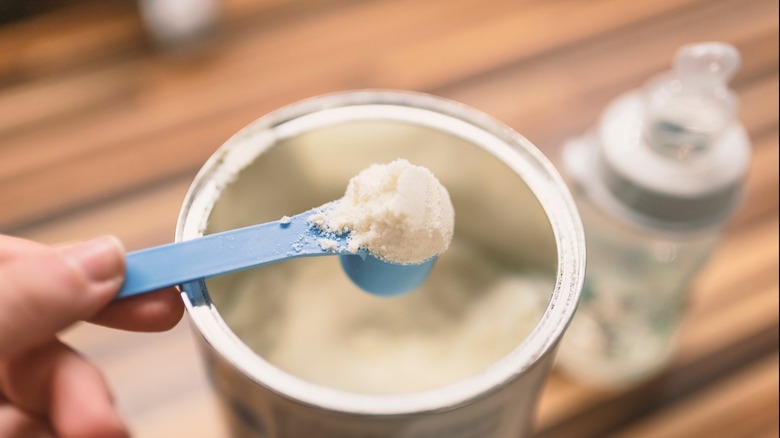The Milestone Children Might Reach Sooner Because Of The Baby Formula Shortage
In February, several of Abbott Nutrition's baby formulas were recalled due to potential contamination by salmonella and cronobacter sakazakii. The baby formula recall was expanded in March after another infant fell ill.
The current formula shortage was set into motion back in 2020, per The Atlantic, when parents stocked up due to the then-new COVID-19 pandemic. As they worked through their formula stockpiles, sales dropped, and companies decreased the amount of formula they were producing. However, once Abbott Nutrition's formulas were recalled, they took out a large chunk of an already-limited supply.
Families with infants have turned to countless alternatives: making baby food at home, participating in online formula swaps, substituting cow or goat milk, diluting formula, and even weaning their babies from formula/milk entirely.
For the record, you should always consult with your pediatrician before making changes to your baby's diet, and under no circumstances should you dilute or supplement store-bought formula. Diluting formula not only can cause electrolyte imbalances, per NBC, but it can also lead to malnutrition and seizures.
Parents are switching their babies to soft foods amid the formula shortage
With baby formula difficult, if not impossible, to get ahold of, many parents have opted to forgo formula entirely. Instead, older infants are being weaned from formula to toddler milk or baby foods. However, both of these pose significant dangers.
Toddler milk, explains the New York Times, is not as well-regulated by the U.S. Food and Drug Administration as baby formula. Because it's meant for older infants, the milk's nutritional contents are also very different. According to Verywell Family, another reason to hold off on making the switch is that babies introduced to soft foods before four months of age are about six times more likely than those remaining on formula to experience childhood obesity.
Fortunately, the baby formula shortage might finally be ending. Abbott production will resume on June 4, with formula reaching store shelves in early July (via CNBC). In the meantime, the U.S. is importing large quantities of formula from Europe to help ease the shortage.

